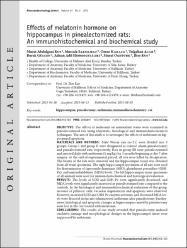Effects of melatonin hormone on hippocampus in pinealectomized rats: An immunohistochemical and biochemical study

View/
Access
info:eu-repo/semantics/openAccessDate
2013Author
Kuş, Murat AbdulganiSarsılmaz, Mustafa
Karaca, Ömür
Acar, Tolgahan
Gülcen, Burak
Hişmioğulları, Adnan Adil
Ögetürk, Murat
Kuş, İlter
Metadata
Show full item recordAbstract
OBJECTIVE: The effects of melatonin on antioxidant status were examined in pinealectomized rats using enzymatic, histological and immunohistochemical techniques. The aim of this study is to investigate the effects of melatonin on hippocampal apoptosis.
MATERIALS AND METHODS: Male Wistar rats (n=21) were divided into 3 groups: Group I and group II were designated as control (sham-pinealectomy) and pinealectomized rats, respectively. Rats in group III were pinealectomized and injected daily with melatonin (1 mg/kg) for 3 months beginning at day 7 after surgery. At the end of experimental period, all rats were killed by decapitation. The brains of the rats were removed and the hippocampus tissue was obtained from all brain specimens. The right hippocampal specimens of all rats were used for determination of superoxide dismutase (SOD), glutathione peroxidase (GSH-Px), and malondialdehyde (MDA) levels. The left hippocampus tissue specimens of all animals were used for immunohistochemical and histological evaluation.
RESULTS: The levels of SOD and GSH-Px were significantly decreased, and MDA levels were significantly increased in pinealectomized rats compared to the controls. In the histological and immunohistochemical evaluation of this group, increase of pyknotic cells, vacuolar degeneration and apoptosis were observed. However, increased SOD and GSH-Px enzyme activities, and decreased MDA levels were detected in the rats administered melatonin after pinealectomy. Furthermore, histological and apoptotic changes in hippocampus caused by pinealectomy were lost in the rats treated with melatonin.
CONCLUSIONS: The results of our study revealed that pinealectomy-induced oxidative damage and morphological changes in the hippocampal tissue were suppressed by melatonin.

















